Zendegi Read online
Page 12
Behrouz spread his hands; he had no idea.
Now that he was out of the direct glare of the spotlights, Martin could see the placement of the helicopters more clearly. Along with the one hovering above the gate, there were four lined up in a queue that stretched eastwards from the far side of the prison. As he watched, a sixth helicopter rose into sight and flew north, up along the slope of the mountains. Then the first in the remaining queue of four approached and descended inside the prison walls. It was like a taxi rank.
Another two groups of men came down the road, carrying two more benches from the park. Martin wasn’t sure how many benches there were in total, but perhaps a large enough pile of them would constitute more than a trivial nuisance that could be moved aside in seconds. As they approached the prison gate there was a burst of automatic gunfire from the helicopter standing sentry; Martin flinched and the men stopped walking, but nobody appeared to have been hit.
He stared at the surreal tableau: the grey wall, the hovering helicopter, the eight men standing in a bright pool of light, holding up the benches like office workers warding off rain with newspaper umbrellas. Belatedly he lifted his phone and began recording.
The group at the front started walking again. There was another burst of gunfire, and one man collapsed. His comrades heaved the bench onto the ground, then two of them lifted the fallen man, who was able to put his arms across their shoulders for support, and they all began walking back towards the park. The second group took a few steps forward, then they too dropped their bench and retreated.
As the injured man approached the edge of the park, a man and a woman ran forward to examine him. There was a dark patch of blood on his right thigh, soaking through his trousers, but he was still conscious; one of the men pulled off his T-shirt and the woman tied it as a tourniquet around the injured leg. Martin knew there were medical students among the protesters, though he hadn’t seen anything more than the most primitive first-aid supplies. He was torn between following the retreating group back into the park and retaining his present vantage point to see what the authorities’ next step would be. He suspected that at any moment a couple of guards would emerge to move the pieces of the aborted blockade aside - and unless all the rules of the game had changed and the protesters were preparing to physically attack the guards, that would be the end of it.
A new sound intruded on the relentless drone of the helicopters. Martin turned to see a white Paykan tearing down the road beside the park, both front doors propped wide open. The car shot past him, heading for the prison; he raised his phone and framed it just as the driver - wearing a motorcycle helmet, a leather jacket and thick swathes of cloth wrapped around his knees and elbows - jumped from the car and rolled across the ground. The gunner in the helicopter opened fire, but Martin couldn’t tell whether he was aiming for the car or the separated driver. In any case, the car kept moving straight ahead, struck one of the upside-down benches with its right wheel, veered sideways, and crashed into the prison gates.
Martin waited, tensed, half-expecting a fireball, but there was nothing; the car hadn’t been packed with explosives, and any damage it had done had been from momentum alone. Bollards protected the gates from being rammed head-on, but the impromptu ramp had allowed a long run-up followed by a sudden sharp swerve. The driver had taken cover in the bushes on the side of the road opposite the prison; he’d probably not got off unscathed, but unless he’d caught a bullet, he was probably not fatally injured either. Before the sound of the impact had stopped ringing in Martin’s ears, he heard a second car approaching. The helicopter left its post and flew rapidly towards the park; he grabbed Behrouz and pushed him flat against the ground, face-down in a mulch of decaying leaves, then stretched his arm out in what he hoped was the right direction and tilted his phone up.
He heard gunfire, then the roar of the car’s engine shifting pitch abruptly as it passed. The second crash was far louder than the first. Martin was shaking; the helicopter was hovering very close to their tree - he could feel the downdraft, and a gentle rain of dislodged leaves. After a few seconds he drew his right arm in towards his body and thumbed the controls on the phone to play back the footage it had captured. He’d caught the second car slamming into the first and travelling four or five metres down the road as the two of them gouged an opening in the prison gates.
Martin still had his left arm across Behrouz’s shoulder and he felt him move as if preparing to stand.
‘Don’t,’ he insisted, ‘it’s right on top of us.’
‘So what’s the plan?’ Behrouz asked.
Having failed to defend the prison from damage, the gunner was probably suffering from a strong urge to compensate by firing at anything that moved. It was possible that the two of them were already visible through gaps in the branches above, but until someone screamed through a loud-hailer that they should get to their feet with their hands in the air, playing possum seemed by far the best strategy.
‘We wait for it to move,’ Martin said.
‘Wait how long?’
‘I don’t know. It can’t stay there forever.’ Martin pictured the helicopter hovering above the tree, the gunner sitting in the open bay. He’d be wearing night-vision goggles, but with any luck he’d be scanning the park and the road for approaching threats, not looking straight down.
A branch above them creaked perilously. Martin wondered if the downdraft could dislodge something heavier than leaves; apparently Behrouz had the same idea. He pushed Martin’s restraining arm aside and rolled onto his back to see what was happening. When he failed to volunteer a report, Martin took a look for himself.
A man was standing in the tree, slowly edging his way out along one of the branches. He was steadying himself with one hand, carrying something in the other. Martin couldn’t actually see any part of the helicopter chassis through the branches and foliage, but the downdraft and the spill from the spotlight gave him a good idea of its location: it was only a few metres from the top of the tree, and their arboreal companion was moving closer to it.
Behrouz said, ‘If the chopper pilot sees him, which way will it move?’
‘Back towards the prison, so the gunner can get a better aim at him.’
‘But if we run in the opposite direction, into the park, we’re going to be right in the line of fire, aren’t we?’
‘Yes,’ Martin agreed. ‘Good point.’
‘So we should run . . . sideways?’
‘I think so.’
Behrouz shifted into a squatting position, ready to move, and Martin did the same. He was still mesmerised by the man in the tree. He could now see that the object in his hand was one of the shovels they’d brought in to dig the latrines. Maybe he’d been hiding up there since nightfall, waiting to swing it into the face of the next Basiji saboteur who crept in to mess with the waste disposal arrangements.
The man brought one shoulder back, stood poised for a second or two, then flung the shovel like a javelin; Martin couldn’t see his target, but there was a thwack followed by a deranged mechanical clatter. Behrouz ran one way, Martin the other, but the javelin thrower chose this moment to jump from the tree, landing on top of Martin and knocking him flat.
‘Fuck!’ He disentangled himself and looked up to see the helicopter spinning wildly, moving backwards away from the park as it spiralled towards the ground. The shovel must have wedged between the tail rotor and its support, long enough to do real damage before the handle snapped and it fell away.
Martin clambered to his feet; he’d hurt his back and his right knee was giving him alarming signals, but he could just about walk. He couldn’t see where the javelin thrower had gone, but a dozen men were running across the park, carrying tree branches and other improvised clubs. Martin watched anxiously as they neared the wounded helicopter; the pilot was struggling to bring it down safely, but it was rolling and pitching erratically as it descended.
It hit the ground with a thud about twenty metres away. The spotlight went o
ut immediately, but as the men rushed in the main rotor was still turning. Martin waited for gunshots, but all he could hear over the engine was shouting. He looked around for his phone and finally located it a few metres away on the grass. He picked it up to start recording the scene, and it emitted a chime; the IR transceiver had come within sight of someone carrying fresh news.
Martin ignored the bulletin and kept filming, though he could make out almost nothing of what was happening in the shadows around the helicopter. The engine finally cut off, making it easier to hear the shouting, but apart from a general tone of belligerence this left him none the wiser. Then three uniformed men emerged from the mêlée, walking with their hands clasped behind their heads in front of a protester carrying an automatic rifle. Their captors made them kneel on the grass, then bound their hands with what Martin guessed were strips of webbing cut from harnesses inside the helicopter.
Behrouz approached. ‘Are you okay?’
‘Yeah. You?’
Behrouz nodded. Martin handed him his phone. ‘Can you read this? I don’t think I’m up to Slightly Smart translations right now.’
Behrouz checked the newsfeed and said, ‘The Ministry of the Interior has been occupied. Seven officials have been taken under citizens’ arrest.’ He held up the phone to show Martin a group portrait of sullen bureaucrats kneeling with bound hands, almost echoing the scene on the grass.
Martin looked over towards the prison. The taxi rank was empty now, with the last of the helicopters flying north across the mountains. He said, ‘They’ve evacuated the management, that’s all.’ Maybe they’d never even planned to move the inmates; rather, the tide was turning so rapidly now that the prison officials and intelligence officers with the most to fear from the crowd’s retribution had opted for self-preservation and a pre-emptive retreat.
They approached the group of men clustered around the helicopter. Martin spotted Kambiz, the student who’d tipped him off to the first protest in Ferdowsi Square; his jacket was torn and he was grinning nervously, managing to look both jubilant and anxious at the same time.
‘What now?’ Martin asked him.
Kambiz gestured at the helicopter. ‘They’re trying to raise someone inside the prison on the radio. Now that VEVAK has run away, maybe we can negotiate with the remaining guards. We’re not here to set thieves and murderers free. But anyone who hasn’t even been before a court should not be in this place.’
Martin said, ‘You’ve got one gun and three prisoners. What is there to negotiate with?’
Kambiz shook his head. ‘It’s not about weapons. I wasn’t even born when the Shah was toppled, but everybody understands that when something rotten starts to fall, you don’t want to be standing where it will bury you.’
Martin glanced up at the watchtower; the sentries there had a clear line of sight, but they hadn’t fired on the men who’d captured the helicopter crew. Nobody wanted to be charged with treason by the present regime - but neither did they want to be charged with murder by their successors.
Half an hour later, the protesters sent a delegation of five people into the prison to negotiate face-to-face. No doubt there were things to be said that couldn’t be spoken over an open radio channel. Martin passed the tense hours that followed interviewing some of the people who’d been involved in the bench/car manoeuvre; the injured man had already been evacuated, but the other participants turned out to be mechanical engineering students who’d rehearsed something similar in the countryside a week before - albeit not with live ammunition and a helicopter. ‘We wanted to fit remote controls to the cars,’ one of them told Martin, ‘but we couldn’t get the parts without attracting suspicion.’ They’d bought half-a-dozen cheap Paykans from wrecking yards and left them in side-streets around the park before the siege had begun.
Just before dawn, the delegation returned. A deal had been struck in which the guards would continue to defend the cell blocks under the control of the prison authority - which held mainly convicted criminals - but they would not interfere with anything that took place in Evin 209 and 240, the political wings which came under VEVAK’s control.
Behrouz translated the news, but when he’d finished he told Martin bluntly, ‘If you report that deal, you can have my resignation. ’ If the regime survived, Martin doubted that his own silence would be enough to save anyone; someone on the inside would surely betray the prison guards to their brave superiors who’d flown off over the mountains. Then again, putting all the details down in newsprint would certainly diminish any prospect of a face-saving decision to let the guards’ inaction go unpunished.
He said, ‘I won’t mention it.’ He could find a circumspect way of phrasing things without actually lying. The protesters were still going to storm the prison, and the guards would still tactically withdraw, to concentrate on keeping the most dangerous prisoners confined. Nobody munching cornflakes in Sydney needed to know that certain choices had been made to allow all this to happen without bloodshed.
The sky was pale blue, but the sun was still hidden behind the apartment blocks of north Tehran as the protesters surged through the broken gates of Evin Prison. Martin let more than a hundred people enter before he even tried to elbow his way into the stream. If there was unexpected resistance ahead, he wanted to be close enough to the vanguard to witness it, but he didn’t feel obliged to put himself at any unnecessary risk. This wasn’t his revolution.
Still, as he and Behrouz passed through the gates and walked with the hushed throng between the grey cell blocks, Martin felt the history of the place weighing down on him. This was where the Shah’s henchmen had imprisoned and tortured his enemies. This was where thousands of opponents of Khomeini had been hanged in mass purges. This was where labour activists, journalists, homosexuals, scholars, environmentalists and women’s rights campaigners had been thrown into solitary confinement, beaten and raped. This was where Baha’i ended up, for the crime of believing in one prophet too many, or proselytising Christians for the crime of believing in one prophet too few. This was where student leaders, after the protests of 1999, had had their faces pushed into drains full of faeces until their bursting lungs had commanded them to inhale, and where ten years later those who’d marched against electoral fraud had been beaten into surreal confessions that the true source of their treasonous passions had been the meddling of foreign puppet-masters and excessive exposure to the BBC. But he couldn’t hold Evin’s obscenities at arm’s length as the aberrations of an alien culture. He had seen the American prison at Bagram, where innocent men had been battered to death; he had seen the detention camps in the Australian desert where refugees had lost their minds and slashed their bodies with razors. The toxic mixture of power and impunity was a universal human disease.
Martin turned to Behrouz, hoping they could exchange a few words that would puncture the solemnity, but the expression on his colleague’s face was so stricken that he looked away again, not wanting to embarrass him.
The watchtowers were deserted now; if anyone was training rifles on the crowd they were well hidden. Martin had read accounts of the prison’s layout by former inmates, but he hadn’t committed the architecture to memory; he could only assume that someone who knew the place inside out was leading them to one of the political wings.
Section 240 was a squat four-storey building with slits for windows. Apparently nobody had left a key under the mat, but Martin was too far from the doors to see exactly what was being done with crowbars, bolt-cutters and battery-powered tools in order to gain entrance.
When the main doors were opened the crowd surged forward, but not very far; inside the building there were more obstructions to be dealt with.
Behrouz said, ‘If every cell is this much work, it’s going to be a long day.’
Martin had read that there were about eight hundred. ‘Good practice for when you queue for your Metallica tickets.’
When they finally managed to squeeze into the building they found themselves in a kind of foye
r between the main doors and a deserted checkpoint with a barred metal gate. There was a glowering portrait of Khomeini on the wall beside a scroll covered in dense writing; Martin sounded out and translated a few words, until Behrouz put him out of his misery. ‘It’s a kind of mission statement, committing everyone who works here to high ethical standards.’ His voice was thick with contempt. ‘It quotes some Quranic verses, but don’t ask me to repeat them, because in the context I’d consider that desecration.’
There was a sound of splintering wood. ‘Keleedha!’ someone shouted excitedly; Martin didn’t need that translated for him. People started passing jangling bunches of keys back through the crowd. A man in front of Martin offered him a bunch; Martin shook his head apologetically. ‘Ruznaame negaaram. Momken nist.’
Behrouz held out his hand and took them.
The protesters spread out, looking for the cells their keys would open. As Martin followed Behrouz to the crowded stairwell, he saw a woman ahead of them turn at the landing and he glimpsed Mahnoosh’s face in profile. He felt a sudden ache of panic in his chest; he wanted to call out to her, to plead with her to be careful, but he was afraid that might sound presumptuous.

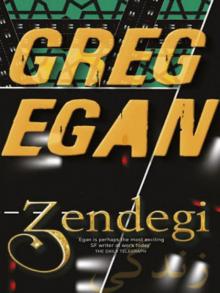 Zendegi
Zendegi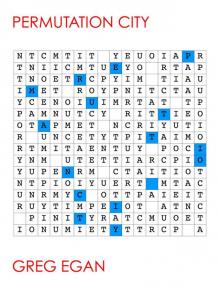 Permutation City
Permutation City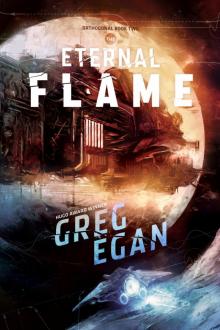 The Eternal Flame
The Eternal Flame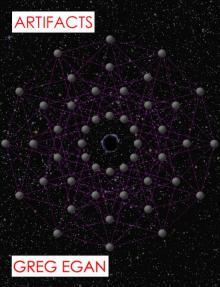 Artifacts
Artifacts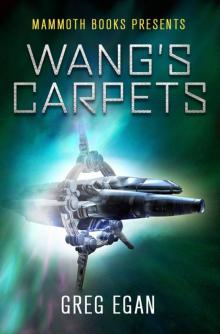 Wang's Carpets
Wang's Carpets Dichronauts
Dichronauts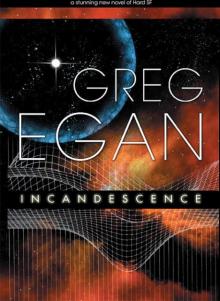 Incandescence
Incandescence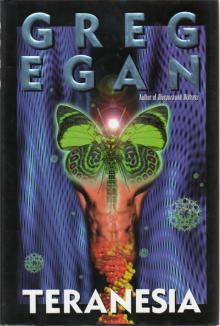 Teranesia
Teranesia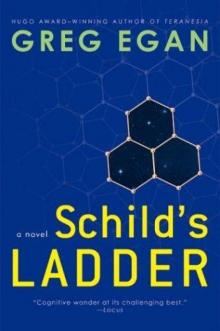 Schild's Ladder
Schild's Ladder Quarantine
Quarantine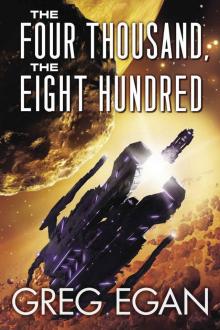 The Four Thousand, the Eight Hundred
The Four Thousand, the Eight Hundred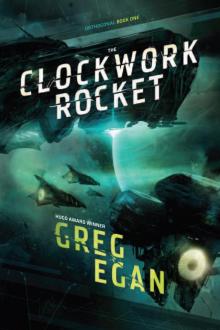 The Clockwork Rocket
The Clockwork Rocket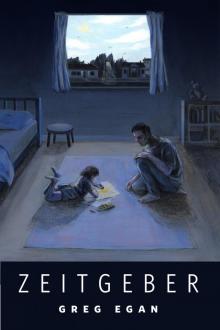 Zeitgeber
Zeitgeber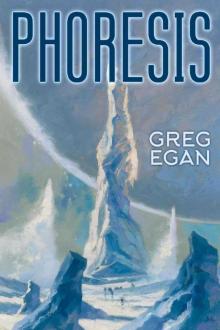 Phoresis
Phoresis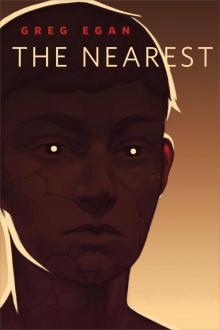 The Nearest
The Nearest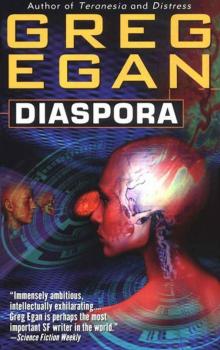 Diaspora
Diaspora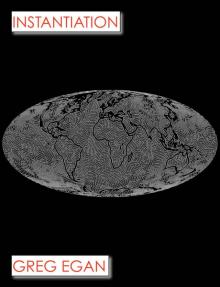 Instantiation
Instantiation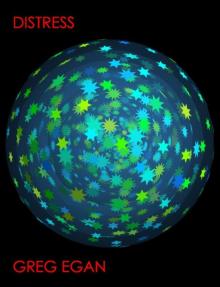 Distress
Distress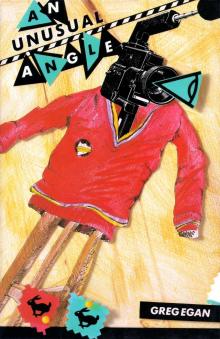 An Unusual Angle
An Unusual Angle Oceanic
Oceanic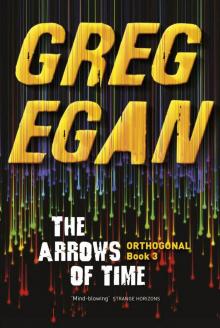 The Arrows of Time
The Arrows of Time Axiomatic
Axiomatic![Anthology 2. Luminous [1998, 2010] Read online](http://i1.bookreadfree.com/i/03/18/anthology_2_luminous_1998_2010_preview.jpg) Anthology 2. Luminous [1998, 2010]
Anthology 2. Luminous [1998, 2010] Perihelion Summer
Perihelion Summer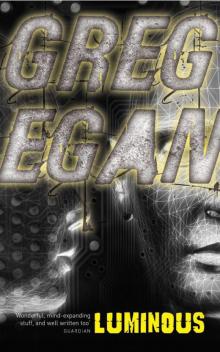 Luminous
Luminous